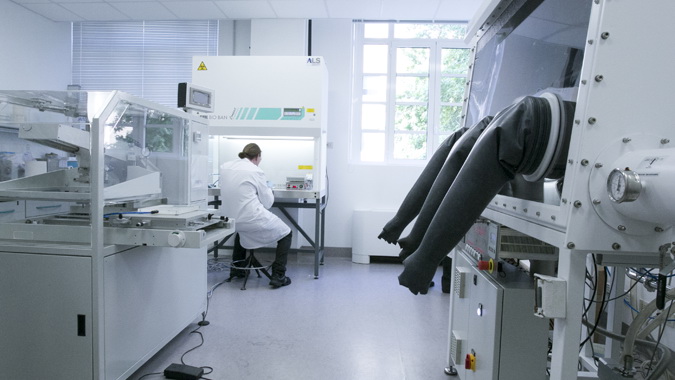
I laboratori del Centro MIB-SOLAR sono localizzati all'interno del Dipartimento di Scienza dei Materiali dell'Università di Milano-Bicocca.
Il cuore del Centro è rappresentato da un nuovo laboratorio di ca. 100 mq in atmosfera protetta ISO7/8 (classe 10,000-100,000), al piano terra del Dipartimento di Scienza dei Materiali (ed. U5), attrezzato per la fabbricazione e caratterizzazione di dispositivi fotovoltaici inorganici e organici di piccole e medie dimensioni (moduli).
Le principali strumentazioni a disposizione del Centro sono le seguenti:
- laboratori totalmente equipaggiati per la sintesi e la caratterizzazione chimica e spettroscopica (NMR multinucleare, assorbimento, emissione, IR) di materiali inorganici ed organici, molecolari e polimerici;
- laboratori totalmente equipaggiati per la sintesi e la caratterizzazione elettrochimica (potenziali di ossidazione e riduzione, energie degli orbitali molecolari, misure di impedenza, ecc.);
- determinazione della stabilità chimica, termica e fotochimica dei materiali;
- strumentazione per la preparazione di celle a film sottile CIGS e CZTS (sputter, strumento per sputtering/evaporazione CIGS, film applicator);*
- strumentazione per la preparazione di celle organiche (molecolari e polimeriche) e a colorante (dye-sensitized solar cells DSC) (serigrafia, piastre a titanio, miscelatori per preparazione di paste, macchine per la pulizia dei substrati, ecc.);*
- glove-box dotata di spin-coater ed evaporatore per la preparazione e caratterizzazione di dispositivi fotovoltaici in atmosfera inerte;*
- simulatore solare per piccole celle fino a 2x2” ed elettronica accessoria;*
- simulatore solare per celle di medie dimensioni e moduli fino a 6x6" ed elettronica accessoria;*
- sistema integrato per la misura delle efficienze quantiche interne ed esterne dei dispostivi fotovoltaici;*
- microscopio elettronico a scansione SEM per lo studio dei materiali (Scanning Electron Microscopy Tescan VEGA TS5136XM equipaggiato con EDX and EBIC; misure tra 77 K e 300 K);
- diverse tipi di spettroscopie per le proprietà ottiche di assorbimento (FT-IR, Raman, UV-Vis-NIR) e fluorescenza dei materiali, anche già in forma pre-assemblata nel dispositivo;
- microraman a triplo stadio: spettrografo e doppio premonocromatore in sottrattivo, range spettrale: 240 – 550 nm nominale con diverse sorgenti di eccitazione disponibili;
- sistemi per misure di proprietà di trasporto elettrico, in particolare strumento per la misura di effetto Hall per lo studio di resistività, densità dei portatori e mobilità elettrica di film sottili (campo magnetico da 0.6 T, sia positivo che negativo; misure tra 15 K e 350 K);
- fornaci (per piccole celle) e piastre a titanio per il trattamento termico dei materiali;*
- banco ottico per misure di Light Beam Induced Current (LBIC);
- evaporatore;
- sistema basato su Quasi Steady-State Photoconductance Decay (QSSPC) per la misura dei tempi di vita;
- studio dell'invecchiamento dei dispositivi sotto illuminazione e stress termico con umidità controllata;*
- gas-cromatografi e cromatografo ionico per l'identificazione e la quantificazione di solar fuels prodotti tramite water splitting, riduzione della CO2 o dell'azoto;
- reattore Picosun R-200 Advanced, per la deposizione di film sottili (< 10 nm) mediante Atomic Layer Deposition (ALD), con controllo dello spessore a livello sub-nanometrico (< 0.5 nm) e uniformità degli strati depositati anche su micro-strutture 3D complesse. Il reattore è equipaggiato con una sorgente plasma a microonde (2.45 GHz di frequenza) alimentata da O2, N2 e Ar, consentendo lo sviluppo e l'utilizzo di processi di deposizione sia per via termica che via plasma. E' possibile seguire in tempo reale la crescita dei film in-situ grazie all'ellissometro Film Sense FS-1 montato sulla camera. Il caricamento dei campioni avviene tramite una camera di load-lock, senza che il vuoto nella camera principale venga interrotto.
* strumentazione in parte acquisita con il finanziamento Grandi Attrezzature dell'Università di Milano-Bicocca, 2010
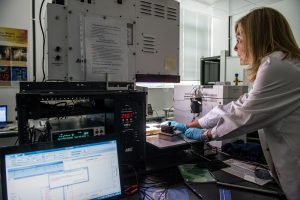
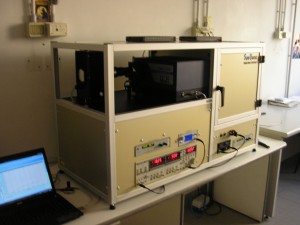
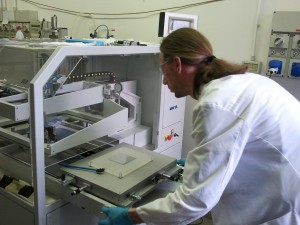
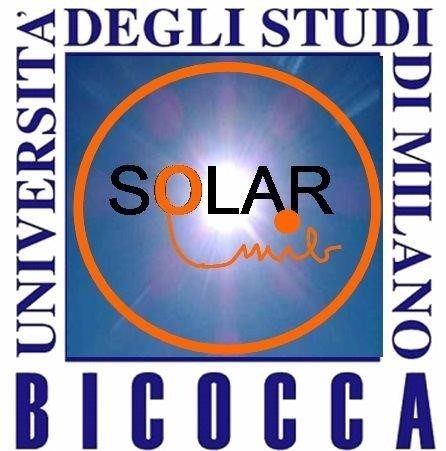
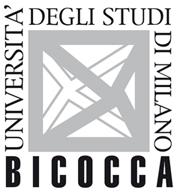 '
'